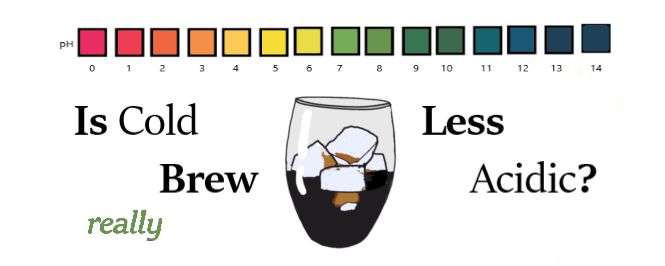There are many widely spread coffee facts that we’ve heard of or read about quite a few times, but we never really question their validity.
In the process of writing my Woke Lark articles, I always search for scientific proof that can back up the information that I share with you.
So I decided to include this post and share my findings on cold brew acidity.
You’ve most likely heard that cold brew coffee is significantly less acidic.
But is there evidence that it is, in fact, a better alternative for coffee lovers with more sensitive stomachs?
What’s the actual pH of cold brew coffee and are its acidity levels lower than those of hot brew?
Let’s check out all the answers, as they might surprise you.
Is cold brew coffee less acidic than hot brew?
Cold brew coffee is very popular and its consumption has been increasing for the last couple of years.
It isn’t only famous for its smooth satisfying taste, but according to a Toddy self-funded study, cold brew coffee is 67% less acidic.
If you aren’t aware, Toddy is actually the brand name of a cold brewing system (you can check it out on Amazon by clicking here). Their study is often cited when cold brew coffee enthusiasts point out their favorite brewing method’s benefits. Nevertheless, this study may be biased and the impressive difference in the acidity of hot and cold brew coffees may not be as big as we’d like to believe it is.
During my research, I found that there aren’t a lot of studies that examine the acidity of cold brew coffee.
Nevertheless, there are some that give better insight into the difference between hot and cold brew, and I will use the data they provide in this article.
So here’s whether cold brew coffee is less acidic than hot brew:
There is evidence that cold brew coffee is in fact less acidic than hot brew.
According to a scientific report published in 2018, the pH values of hot and cold brew coffee samples were found to be comparable within a range of 4.85 to 5.13.
For example, the pH values of the Myanmar hot brew coffee samples in the said study were 4.92 ± 0.03, while the cold brew samples had a pH of 5.13 ± 0.03.
The pH scale is logarithmic (pH 4 is 10 times more acidic than pH 5) which means that the Myanmar cold brew coffee samples were 2 times less acidic than the same coffee, brewed with hot water.
Nevertheless, when comparing some other samples, it was found that there weren’t significant differences in their pH values.
Even though the pH of hot brewed coffee wasn’t always lower compared to the pH of its cold brew version, the titratable acidity measures were higher in all hot coffee extracts.
This indicates that hot water extracts additional acidic compounds from your beans.
This may be the reason why cold brewing results in a smoother cup with lower perceived acidity, meaning that cold brew coffee overall tastes less acidic.
This is the study that investigates the acidity and antioxidant activity of hot and cold brew coffee.
The scientists used the same coffee-to-water ratio for both brewing methods.
Contrary to what you may have thought, cold water coffee extracts didn’t always result in a brew with a drastically higher pH value.
It was found that the pH may not be an adequate measurement for the complex acid chemistry in coffee extracts, as hot brewed coffee always had a higher concentration of total titratable acids.
Furthermore, hot brew extracts had higher antioxidant activity.
What’s also worth noting is that cold brew coffee is usually made with darkly roasted coffee beans.
The longer the coffee is roasted and the higher the roasting temperature – the more of its acids (such as chlorogenic acid) get lost.
So this could be another reason why cold brew coffee is usually less acidic.
People rarely make cold brew coffee with light roasted coffee. A lighter roast profile is common in the specialty coffee world. It gives you the opportunity to experience the natural flavors of high-quality beans. Said flavors aren’t easily extracted with cold water which is why I wouldn’t use my single-origin light coffee beans for cold brew.
Related Posts:
Is Cold Brew Coffee Better for Those who Experience Heartburn?
Many people who suffer from GERD or often experience heartburn feel much better after switching to cold brew coffee.
There is actually evidence that titratable acidity may be associated with more reported heartburn.
Nevertheless, foods and beverages don’t affect different individuals the same way, so it wouldn’t be wise to say that cold brewing is a better alternative for all people with GERD symptoms.
For example, a serving of cold brew coffee usually contains more caffeine compared to a serving of hot-brewed coffee.
Some studies suggest that caffeine may promote acid reflux, so cold brew coffee may still cause such discomfort in some individuals.
Cold Brew Coffee Acidity & Flavor
When it comes to taste, it’s worth mentioning that many coffee enthusiasts prefer their coffee crisp and juicy, or in other words, pleasantly acidic.
Those are the ones who invest in high-quality single-origin coffee beans. They rarely use the cold water extraction method, as it doesn’t extract all the pleasant intrinsic flavors of their expensive coffee.
On the other hand, others consider acidic coffee unpleasant.
So there are many coffee consumers who tend to avoid acidic flavors in their cup of Joe, which is one of the reasons why cold brewing is gaining more and more followers.
Not only does it result in a rich cup with enhanced natural sweetness, but the bitterness and the overall perceived acidity (sourness) are notably decreased, compared to brewing with hot water.
Not to mention that the oxidation and degradation of coffee molecules are slowed down when coffee is brewed with cold water.
This means that it won’t go bad as quickly, and you can store it in the fridge in a container for up to two weeks.
It will still taste good even 10 days after you’ve cold-brewed your batch, which is definitely an advantage.
Related Post: How long can coffee be left to sit out?
Final Words
Now that you know that cold brew and hot brew coffee may have similar pH values, but differ in their acidity levels, you can try lowering your coffee’s acidity by implementing this popular brewing method.
To further lower the acidity of your cup you can stick to darker roasts, as they are usually less acidic than light roasts.
With all being said, if you’re aiming for a cup of coffee that tastes less acidic, cold brew is definitely a great solution.
The flavor profile of cold-brewed coffee is often completely different than the same, made with hot water.
If cold brew suits your taste better – stick to it.
But don’t be misled into thinking that its pH values are much higher than those of hot brew.
I hope you found some useful information in this Woke Lark article. If you want, you can check out my complete guide on how to make cold brew coffee at home.
Please, drop me a comment below to share your thoughts.


Which coffee do you order from amazon? I have IC as well and looking for solutions. Thanks
I appreciate the work put into this post; I half-expected the typical blog fare of just repeating yourself for 2000 words to pad out the SEO.
As someone that suffers with Interstitial Cystitisif I drink coffee I will have a flare of horrible symptoms for 24/48 hours about three hours after I finish a coffee… it doesn’t matter how much milk I try and add to lessen the impact on my bladder. However….. I can drink the Starbucks cold brew.. while at home I drink a no acid coffee I can order through Amazon. But as far as the cold brew coffee there is absolutely no way it is not less acidic then regular coffee…